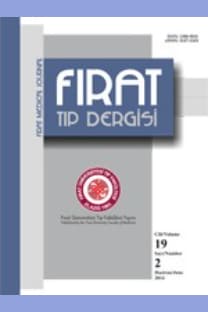Talusun osteokondral lezyonlarının tedavisinde mikrokırık yöntemi sonuçlarımız
Our results of microfracture method in the treatment of osteochondral lesions of talus
___
- 1) Özenci AM, Aydın AT. Ergenlik döneminde görülen talusun osteokondral lezyonları. Acta Orthop Traumatol Turc 2004; (3)1: 138-144.
- 2) Kumai T, Takakura Y, Higashiyama I, Tamai S. Arthroscopic drilling for the treatment of osteochondral lesions of the talus. J Bone Joint Surg [Am] 1999; 81(9): 1229-35.
- 3) Bohay DR, Anderson JG. Osteochondral defects of the talar dome: debridement and drilling. Techniques in Foot and Ankle Surgery 2004; 3(1): 40-44.
- 4) Stone JW. Arthroscopic treatment of osteochondral lesions of the talar dome. Sports Medicine and Arthroscopy Review 2000; 8(4): 343-353
- 5) Roach R, Mcbride DJ, Maffulli N. Osteochondral lesions of the talus. Minerva Ortop Traumatol 2002; 53(3): 157-163.
- 6) Sexton AT, Labib AS. Osteochondral lesions of the talus: current opinions on diagnosis and management. Curr Opin Orthop 2007; 18(2): 166-171.
- 7) Chew KTL, Tay E, Wong YS. Osteochondral Lesions of the Talus. Ann Acad Med Singapore 2008; 37: 63-8.
- 8) Van Bergen CJ, de Leeuw PA, van Dijk CN. Potential pitfall in the microfracturing technique during the arthroscopic treatment of an osteochondral lesion. Knee Surg Sports Traumatol Arthrosc 2009; 17(2): 184-187.
- 9) Berndt AL, Harty M. Transchondral fractures (osteochondritis dissecans) of the talus. J Bone Joint Surg [Am] 1959; 41: 988- 1020
- 10) Pritsch M, Horoshovski H, Farine I. Arthroscopic treatment of osteochondral lesions of the talus. J Bone Joint Surg [Am] 1986; 68(6): 862-865.
- 11) Giannini S, Buda R, Faldini C, Vannini F, Bevoni R, Grandi G, Grigolo B, Berti L. Surgical treatment of osteochondral lesions of the talus in young active patients. J Bone Joint Surg [Am] 2005; 87(2): 28-41.
- 12) Robinson DE, Winson IG, Harries WJ, Kelly AJ. Arthroscopic treatment of osteochondral lesions of the talus. J Bone Joint Surg [Br] 2003; 85(7): 989-93.
- 13) Canale ST, Belding RH. Osteochondral lesions of the talus. J Bone Joint Surg [Am] 1980; 62(1):97-102.
- 14) Anderson IF, Crichton KJ, Grattan-Smith T, Cooper RA, Brazier D. Osteochondral fractures of the dome of the talus. J Bone Joint Surg [Am] 1989; 71(8): 1143-52.
- 15) Tis JE, Chambers H, MD, Ball ST. Transtalar drilling of osteochondral lesions of the talus in children and adolescents. Techniques in Foot and Ankle Surgery 2004; 3(1): 62-67.
- 16) Stone JW. Osteochondral lesions of the talar dome. Am J Orthop. 2007; 36(12): 643-646.
- 17) Baums MH, Heidrich G, Schultz W, Steckel H,Kahl E, Klinger HM. Autologous Chondrocyte Transplantation for Treating Cartilage Defects of the talus. J Bone Joint Surg [Am]. 2006; 88(2): 303-8.
- 18) Bilgin SS, Köse KÇ, Adıyaman S, Demir Taş M. Ayak bileği lezyonlarında artroskopik cerrahinin erken dönem fonksiyonel sonuçları. Acta Orthop Traumatol Turc 2004; 38(1): 23-29.
- 19) Aşık M, Şen C, Bilen FE, Kılıçoğlu Öİ, Taşer ÖF. Talus osteokondral lezyonlarında artroskopik tedavi. Acta Orthop Traumatol Turc 2001;35:56-62.
- 20) Yercan HS, Okcu G, Aydoğdu S. Talusun osteokondral lezyonlarında artroskopik drilleme yönteminin etkinliği. Joint Dis Rel Surg 2004; 15(4): 214-219.
- 21) Saxena A, Eakin C. Articular talar injuries in athletes: results of microfracture and autogenous bone graft. Am J Sports Med. 2007; 35(10): 1680-7.
- 22) Scranton PE Jr, Frey CC, Feder KS. Outcome of osteochondral autograft transplantation for type-V cystic osteochondral lesions of the talus. J Bone Joint Surg [Br] 2006; 88(5): 614-9.
- 23) Chodos MD, Schon LC. Osteochondral lesions of the talus: current treatment modalities and future possibilities. Curr Opin Orthop 2006; 17: 111-116.
- ISSN: 1300-9818
- Başlangıç: 2015
- Yayıncı: Fırat Üniversitesi Tıp Fakültesi
İntraduktal papillomu taklit eden meme başı adenomu olgusu
Işıksalan Nilgün ÖZBÜLBÜL, Aylin ÖZGÜN, Ufuk ÖZGÜN, Selçuk PARLAK
Parotis bölgesinde pilomatriksoma: Vaka sunumu
SEDA TÜRKOĞLU BABAKURBAN, Nazım Emrah KOÇER, ALPER NABİ ERKAN
Talusun osteokondral lezyonlarının tedavisinde mikrokırık yöntemi sonuçlarımız
Hacı Bayram TOSUN, Erhan YILMAZ
Relationship between estradiol level and sleep quality in healthy women
Oligospermik infertil bir erkekte resiprokal translokasyon t(1;5)(p33;qter)
Koroner baypasta in-situ safen ven grefti hazırlanması intimal hasarı azaltır mı?
Ali Vefa ÖZCAN, Ferda BİR, İbrahim GÖKŞİN, Mustafa SAÇAR, Gökhan ÖNEM, Ahmet BALTALARLI
Ailevi akdeniz ateşi hastalarında vücut kompozisyonunun değerlendirilmesi
İSMAİL SARI, TEVFİK DEMİR, Gerçek CAN, Servet AKAR, AHMET MERİH BİRLİK, Fatoş ÖNEN, Mehmet TUNCA, Nurullah AKKOÇ
Brakidaktili tip C: Olgu sunumu
Mehmet Selim NURAL, Cavit Türkay YALIN, Mehmet Özgür YILDIRIM, Haldun Barış DİREN
Fasioliazis; nadir bir kronik kolesistit nedeni
MEHMET İLKİN NAHARCI, Gökhan ERDEM, Cemal Nuri ERÇİN, Teoman DOĞRU, İLKER TAŞÇI, Fatih ÖRS, Serkan TAPAN, Alper SÖNMEZ
